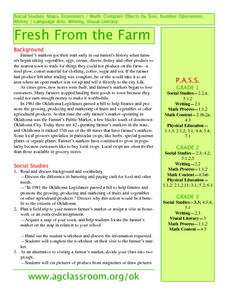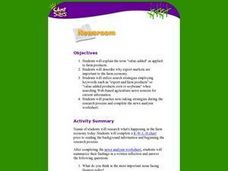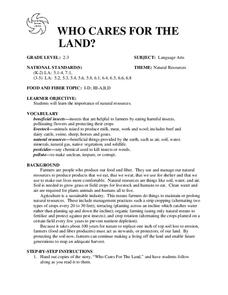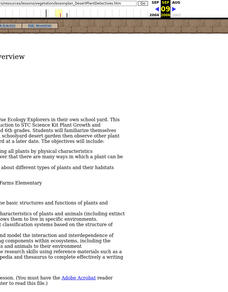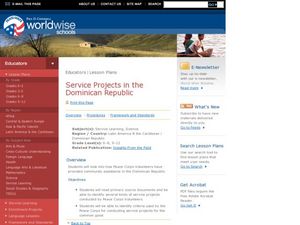Curated OER
Defining Agriculture and Natural Resources
Students define agricultural using concept maps. For this agriculture lesson, students use concept maps to determine the ideas that are related to agriculture such as farming, food, flowers, and forestry before defining the word...
Curated OER
A River Through Time
Learners explore how construction of a dam on the Gila River affected the lifestyle of Pima Indians. In this social studies lesson, students locate the Gila River and the Coolidge Dam. Learners record dates on a timeline and discuss how...
Curated OER
Contrasting Landscapes - UBC Farm Field Trip
Students visit the UBC Farm. For this lesson on various landscapes, students spend a day at the University of British Columbia exploring the farm and trail adjoining the campus. This lesson could be modified for use in any region that...
Curated OER
Farm Animals - Mothers and Babies - "Are You My Baby?"
Students listen to a teacher read aloud and discuss the farm animals. They participate in an role playing activity that explains how mother mammals recognize their young by their scent.
Curated OER
Fresh From The Farm
Students investigate the concept of a farmer's market and how it used in the community. They conduct a survey to find the kinds of produce grown to be sold in the market. The lesson includes extensive introductory information for...
Curated OER
Newsroom
Students use the Internet and graphic organizers to organize the information they collect about farm products and exports.
Curated OER
Baa, Ram, Ewe.... Sheep Tales
Students explore animal characteristics by reading animal stories in class. In this sheep habitat lesson, students identify the uses for sheep in our agricultural based society and the importance of wool in our economy. Students read...
Curated OER
WHO CARES FOR THE LAND?
Learners explore the importance of natural resources. They are given copies of the story, "Who Cares For The Land," and students follow
along as the teacher reads it. Learners identify the key points in the story. (Soil, water and air...
Curated OER
Sustainability
Here is an in-depth, and incredibly thorough lesson plan on sustainable agricultural practices; specifically, regarding the growth of coffee. After completing and discussing a worksheet called "Thinking About Tomorrow," groups of...
Curated OER
Closing the Salary Gap
Students explore careers in their community and compare the average salaries for men and women working in those careers. They explore a variety of careers available in their community through participating in this lesson.
Curated OER
Physical Activity and Energy
Does smiling take as much energy as running a lap around the track? Everything the body does requires energy. The more vigorous the activity, the more energy the body requires to perform the activity. Compare different low-energy...
Serendip
Changing Biological Communities – Disturbance and Succession
After cutting down a forest to make a farm, how long would it take the environment to turn an abandoned farm back into a forest? Scholars study this exact scenario while they interpret many charts and graphs of the changing ecosystems as...
Curated OER
Desert Plant Detectives
Learners examine and categorize plants in their own schoolyard desert garden and then observe other plant areas of their schoolyard.
Curated OER
Fantastic Flower
Here is a clever lesson on pollination of flowers for you. In it, learners study the anatomy of a flower, and play a game in which they simulate the process of pollination. This fine plan brings in elements of art, physical education,...
Virginia Department of Education
Changes in Ecosystems
How does water pollution affect the environment? Provide your class with the resources to answer this question as they learn about eutrophication and ecosystem changes. Over two weeks, they simulate the effects of pollution on the...
Curated OER
Pizza Farm Activities
Students identify the food groups and agricultural sources of pizza ingredients. They construct a construction paper pizza, identify the crops grown for pizza ingredients, and make and eat English muffin pizzas.
Curated OER
The Case of Vanishing Farmland
High schoolers consider decisions about how to use resources that are in short supply. Students role-play different perspectives in a land-use simulation, and examine land use issues around the world. This interesting lesson sheds light...
Agriculture in the Classroom
A Rafter of Turkeys
How did that turkey get from the early Aztec culture to your table? Learn about the history of wild and domesticated turkeys in North America, as well as their inclusion in Thanksgiving traditions, with a two-part agricultural science...
Curated OER
Natural Resources and Ancient Cities
Students explain how the availability of natural resources has affected human settlement patterns. They recognize the interactions of human populations on environments and compare the growth of two ancient cities in relation to natural...
United Nations
Compost Monitor Training
What should go in the trash, and what can be composted? Guide your young conservationists through the process of composing their trash with a lesson about the different ways we can dispose of garbage. Using a trash bag with clean...
SF Environment
Pre-School Composting and Recycling!
You can never be too young to get involved in composting or recycling. Here is a lesson that has been made for the very littlest learners and it's all about the importance of conservation. They'll sort compostable and recyclable objects,...
Curated OER
Service Projects in the Dominican Republic
Students examine the role of Peace Corps volunteers. In this service instructional activity, students investigate service projects that feature agriculture, small business, education, environmental education, and health concerns in the...
Curated OER
The 1927 Flood
Upper elementary and middle schoolers examine the Great Flood of 1927 in the state of Arkansas. They each prepare an oral report about this flood and the huge impact it had on the economics of that time. Additionally, learners research...
Curated OER
Glided Age
Eleventh graders will participate to brainstorm on the overhead, characteristics of an "irresponsible" adult and 5 of a "responsible" one? How do these differ if we apply these to businesses? Working in partners--Create a Code of Ethics...
Other popular searches
- Organic Farming Lessons
- Organic Farming Soil
- Organic Farming Compost
- Organic Farming in Nigeria
- Organic Farming in Ireland
- Careers Organic Farming




